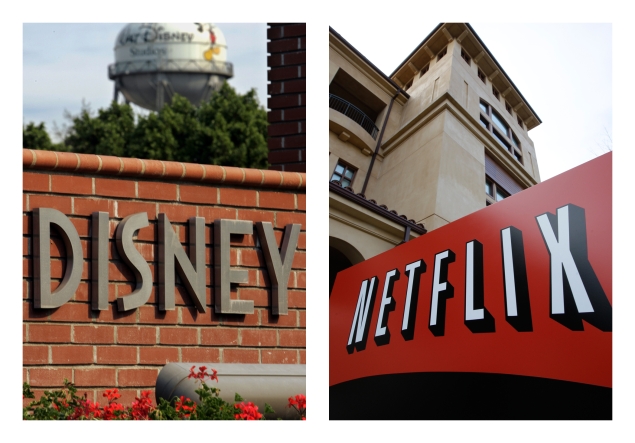- Home
- Internet
- Internet News
- Netflix outbids Starz for rights to Disney movies
Netflix outbids Starz for rights to Disney movies

The multiyear licensing agreement announced Tuesday represents a breakthrough for Netflix as it tries to secure more exclusive programming for a popular service that streams video over high-speed Internet connections. The approach is making Netflix more like traditional pay-TV channels such as HBO, Starz and Showtime.
Financial terms weren't disclosed, but analysts estimate that Netflix will pay Disney more than $350 million annually. That's a hefty bill that will require Netflix to accelerate its subscriber growth or consider raising its prices - something that management has vowed not to do after rankling customers with rate hikes last year.
Netflix is snatching the rights to the Disney movies from Starz, which had failed to reach terms on renewing a separate licensing agreement with Netflix. Until February, Netflix's streaming service had access to Disney movies through that Starz deal. The loss had been interpreted as a blow that diminished Netflix's market value.
Investors applauded Netflix Inc. for trumping Starz to get the Disney rights directly from The Walt Disney Co. and for winning an exclusive provision that shuts out Starz and other rivals.
Netflix shares surged $10.65, or 14 percent, to close Tuesday at $86.65, its highest closing price since April. That's still far below its peak of nearly $305, reached around the time that Netflix announced it price increase in July 2011. Rates went up as much as 60 percent for those who wanted to stream Internet video and keep receiving DVDs through the mail, too.
The stock of Starz's owner, Liberty Media Corp., sank $5.49, or nearly 5 percent, to $105.56. Disney shares added a penny to $49.30.
It's the first time that one of Hollywood's major studios has sold the coveted first-run rights to Netflix Inc. instead of a premium TV network.
DreamWorks Animation SKG Inc. licensed the pay-TV rights to its movies to Netflix last year under a deal that begins in 2013, but those movies don't wield the same box-office appeal as Disney.
"It's a bold leap forward for Internet television and we are incredibly pleased and proud this iconic family brand is teaming with Netflix to make it happen," said Ted Sarandos, Netflix's chief content officer.
Netflix CEO Reed Hasting is counting on more compelling movies and TV shows to attract more customers. The company is hoping they will become loyal subscribers once they see how much video is available for just $8 per month a price that undercuts the rates of most pay-TV channels. Furthermore, Netflix is available as a stand-alone service, while premium channels such as Starz require cable or satellite TV packages that average about $80 a month.
Netflix had 25.1 million Internet video subscribers in the U.S. through September, up from 21.5 million at the same time last year. Starz's premium channel had 20.8 million subscribers at the end of September, up from 19 million a year ago.
Janney Capital Markets analyst Tony Wible said the licensing agreement was a sign of Disney's long-term faith in Netflix, despite intensifying competition in streaming services from Amazon.com Inc., Comcast Corp. and Verizon Communications Inc.
The Disney agreement gives Netflix's streaming service the exclusive U.S. rights to offer Disney's live-action and animation movies during the period normally reserved for pay-TV channels. That period typically starts about seven months after movies leave theaters. The subscription service can then usually show the movies for an 18-month stretch. The Disney exclusivity does not extend to DVDs, a service Netflix is trying to phase out.
Starz retains the rights to all Disney movies released in theaters through 2015, with Netflix picking them up on films released in 2016 and beyond. Disney's direct-to-video movies will come to Netflix next year, while classic films such as "Dumbo" and "Alice in Wonderland" will be released to Netflix immediately.
Disney's stable includes Pixar Animation and Marvel and soon will boast Lucasfilm's "Star Wars" franchise, too. Its $4.05 billion acquisition of Lucasfilm will spawn at least three additional installments of the "Star Wars" saga. However, the next installment won't likely be included in Netflix's package because Disney intends to release the next "Star Wars' movie in theaters in 2015, giving Starz the rights. Netflix will be in line for subsequent "Star Wars" chapters.
Wedbush Securities Michael Pachter said he doubts the Disney films will attract enough subscribers to offset the expense.
"These costs are going to sink Netflix," he said.
Pachter has been urging investors to sell their Netflix stock because he believes the company will either lose money or post puny profits for the years to come.
Netflix's rising costs for Internet video rights have emerged as a major source of concern as the company's earnings have dwindled during the past year. The company, which is based in Los Gatos, Calif., already has warned that it may record a loss for the last three months of 2012, which would be its second quarterly loss of the year. Depending on the size of the potential fourth-quarter setback, Netflix could finish this year with its first annual loss in a decade.
Even before signing the Disney deal, Netflix owed $5 billion in Internet video licensing fees during the next five years, including $4.5 billion due before the end of 2015. Netflix's annual revenue this year is expected to total about $3.6 billion.
Wible, the Janney analyst, said Netflix may have wanted to strike a deal with Disney several years before the movies can be shown on its service to bolster investors' confidence in the company. That, he said, could give Netflix a better chance to sell bonds or stock to raise more money to pay Disney and other studios for Internet video rights.
"The biggest uncertainty is whether Netflix will use this as an excuse to raise capital," Wible said.
Starz played down the loss of the Disney rights. In a statement, Starz said it would now have more money to invest in developing original TV series. Netflix also has been financing exclusive episodic programming and had similar played down its loss of Starz when that deal expired in February.
After Disney defects to Netflix, Starz will still hold the first-run rights to films released by Sony's stable of movie studios That deal applies theatrical releases through 2016 from Columbia, TriStar, Screen Gems and several other Sony-owned studio.
Liberty Media plans to spin off Starz into a separate, publicly traded company early next year.
Catch the latest from the Consumer Electronics Show on Gadgets 360, at our CES 2026 hub.
Related Stories
- Samsung Galaxy Unpacked 2025
- ChatGPT
- Redmi Note 14 Pro+
- iPhone 16
- Apple Vision Pro
- Oneplus 12
- OnePlus Nord CE 3 Lite 5G
- iPhone 13
- Xiaomi 14 Pro
- Oppo Find N3
- Tecno Spark Go (2023)
- Realme V30
- Best Phones Under 25000
- Samsung Galaxy S24 Series
- Cryptocurrency
- iQoo 12
- Samsung Galaxy S24 Ultra
- Giottus
- Samsung Galaxy Z Flip 5
- Apple 'Scary Fast'
- Housefull 5
- GoPro Hero 12 Black Review
- Invincible Season 2
- JioGlass
- HD Ready TV
- Laptop Under 50000
- Smartwatch Under 10000
- Latest Mobile Phones
- Compare Phones
- OPPO Reno 15 FS
- Red Magic 11 Air
- Honor Magic 8 RSR Porsche Design
- Honor Magic 8 Pro Air
- Infinix Note Edge
- Lava Blaze Duo 3
- Tecno Spark Go 3
- iQOO Z11 Turbo
- Lenovo Yoga Slim 7x (2025)
- Lenovo Yoga Slim 7a
- Lenovo Idea Tab Plus
- Realme Pad 3
- Moto Watch
- Garmin Quatix 8 Pro
- Haier H5E Series
- Acerpure Nitro Z Series 100-inch QLED TV
- Asus ROG Ally
- Nintendo Switch Lite
- Haier 1.6 Ton 5 Star Inverter Split AC (HSU19G-MZAID5BN-INV)
- Haier 1.6 Ton 5 Star Inverter Split AC (HSU19G-MZAIM5BN-INV)







![[Sponsored] Haier C90 OLED TV | Dolby Vision IQ, 144Hz OLED and Google TV in Action](https://www.gadgets360.com/static/mobile/images/spacer.png)








